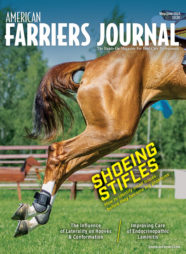NEWS AND NOTES
Legislation Needed for More Effective Enforcement
June 20, 2012
The U.S. Department of Agriculture announced the release of its final rule requiring uniform mandatory minimum penalties for violations of the federal Horse Protection Act. USDA-certified horse industry organizations operate alongside the USDA to enforce the Horse Protection Act by conducting inspections at Tennessee Walking Horse competitions. The final rule also clarifies that the agency can decertify a horse industry organization for any failure to comply with the regulations.
This is a much-needed step to strengthen enforcement of the act, which prohibits the showing and transporting of horses whose legs have been “sored” through the application of painful chemicals or other painful training methods to force them to perform an artificially high-stepping gait for show competitions. The HSUS thanked Secretary Tom Vilsack and USDA for taking this action to protect horses.
“We know that soring is not limited to a ‘few bad apples,’ and we applaud USDA’s decision to crack down on violators across the industry,” said Wayne Pacelle, president & CEO of The HSUS. “Congress should take further steps to give USDA the tools it needs to eradicate cruel soring practices once and for all.”
In 2010, The HSUS and other horse industry and animal protection groups filed a legal petition with USDA seeking regulatory changes to improve enforcement of the Horse Protection Act – including the implementation of a mandatory penalty structure. When the agency announced its intention to require mandatory penalties, several of the largest HIOs refused to comply and have continued to dole out penalties indiscriminately. In May 2011, USDA proposed a rule to make the change official.
There is abundant evidence revealing that soring of Tennessee Walking horses and other related breeds remains prevalent throughout this industry despite the decades-old law. A recent undercover investigation by The HSUS led to a 52 count indictment of Jackie McConnell, a well-known Tennessee Walking Horse trainer, and three of his associates. McConnell pleaded guilty to felony conspiracy to violate the HPA after he was caught on video soring and violently abusing horses. At the time of the investigation, McConnell was under a five-year federal disqualification from participating in horse shows – yet continued to train horses and get them into the show ring.
Between 2010 and 2011, HIOs cited each of the top 20 trainers in the industry’s Riders Cup point program for violations of the HPA—with a total of 164 citations between them. Of the violations recorded, the HIOs only issued penalties for 25 percent, most of which were mere two-week suspensions from showing. Even more disturbing, less than 30 percent of those penalties were actually served and some trainers were allowed to serve multiple penalties simultaneously.
These statistics clearly illustrate that soring is still practiced among the top ranks in the Tennessee Walking Horse industry and that the industry’s current penalty structure has failed to deter trainers from abusing horses in violation of federal law. The law needs to be substantially strengthened in order to end a practice that has been illegal yet has continued unabated for more than 40 years.
2010/2011 HPA Violation Records:
- Of the top 20 trainers participating in the industry’s Riders Cup point program in 2011, 100 percent were cited by horse industry organizations for violations of the Horse Protection Act within the past two years
- In total, 164 violations were cited for these trainers
- Under the current penalty structure in place for the largest horse industry organizations, only 25 percent (41out of 164) of the violations called for penalties, most of which were only two-week suspensions
- Only twelve of those 41 penalties were actually served—and some were served simultaneously by one trainer.
In addition to the top 20 trainers, there were 195 violations of the Horse Protection Act cited for trainers ranking from #21 – #74. Forty-two out of 53 of those trainers were cited during this two year period.
Media Contact: Stephanie Twining, 240-751-3943, stwining@humanesociety.org
Follow The HSUS on Twitter. See our work for animals on your Apple or Android device by searching for our “HumaneTV” app.
The Humane Society of the United States is the nation's largest animal protection organization — backed by 11 million Americans, or one of every 28. For more than a half-century, The HSUS has been fighting for the protection of all animals through advocacy, education and hands-on programs. Celebrating animals and confronting cruelty — On the Web at humanesociety.org.







Post a comment
Report Abusive Comment